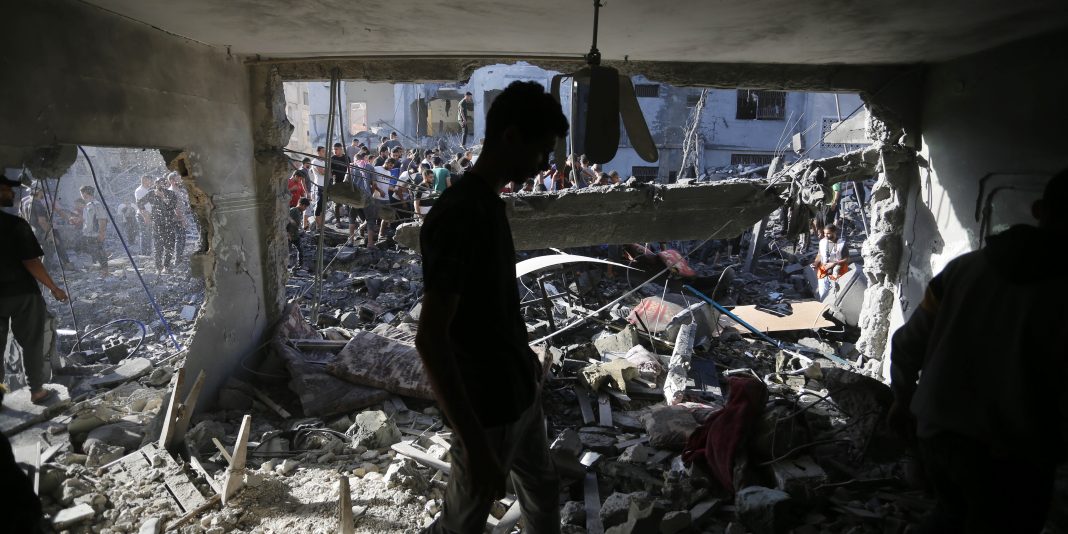In a dramatic escalation of hostilities, the Israeli military has launched a significant bombing campaign in Lebanon, marking the most intense military action in the region since the 2006 conflict. This renewed violence began last week with the remote detonation of thousands of personal electronic devices, followed by a devastating strike that leveled a building in the Beirut suburbs. By the end of the weekend, Israeli forces had bombed approximately 1,300 targets, resulting in a staggering death toll of at least 490 individuals, including over 90 women and children. This grim statistic underscores the severity of the situation, which has already surpassed the casualties recorded during the 2006 Israel-Hezbollah War.
The recent bombings are part of a broader conflict that reignited on October 7, when exchanges of fire began between Israel and Hezbollah, a Lebanese Shia group backed by Iran. The Israeli government has justified its military actions by claiming to target Hezbollah’s weapons supplies. However, these strikes have also tragically impacted civilian infrastructure, including hospitals and medical centers, raising serious concerns about the humanitarian implications of such military operations. Lebanon’s health minister has confirmed that the strikes have resulted in numerous civilian injuries and fatalities.
As the violence escalates, critics of U.S. foreign policy are increasingly vocal about the implications of American military support for Israel. Representative Rashida Tlaib, for instance, highlighted the moral dilemma of continuing arms transfers to Israel amidst reports of civilian casualties. “It’s easier to stop sending the Israeli government weapons to conduct its genocidal wars than it is to evacuate every American in Lebanon,” she stated, reflecting a growing sentiment among some lawmakers and activists advocating for a reassessment of U.S. military aid to Israel.
The Biden administration’s military support for Israel has been a contentious issue, particularly in light of recent events. In May, the U.S. paused the transfer of certain munitions to Israel, including 2,000-pound bombs, amid concerns over their use in densely populated areas. However, under pressure from pro-Israel lobby groups, the administration resumed shipments of smaller munitions, raising questions about the effectiveness of U.S. policy in mitigating civilian harm.
Experts like Stephen Semler, co-founder of the Security Policy Reform Institute, have pointed out that the munitions used in the recent attacks are likely American-made. “As more forensic evidence is recovered in Lebanon, we shouldn’t be surprised to see U.S. fingerprints all over it,” he noted, emphasizing the reliance of the Israeli military on U.S. arms. Semler’s research indicates a troubling pattern of U.S. munitions being used in potential violations of humanitarian law, further complicating the narrative surrounding U.S. involvement in the conflict.
The Israeli military has framed its operations as necessary for securing its borders and protecting its citizens, particularly those displaced from northern Israel. However, this justification has been met with skepticism, especially given the historical context of Israel’s military actions in Lebanon. The Israeli Diaspora Affairs Minister, Amichai Chikli, has even suggested a permanent military presence in southern Lebanon to counter Hezbollah, a statement that has reignited fears of potential annexation and occupation.
The United Nations peacekeeping mission in Lebanon has expressed grave concern for civilian safety amid the renewed strikes, calling for a recommitment to UN Security Council Resolution 1701, which aims to address the underlying causes of conflict in the region. The ongoing violence has also prompted Hezbollah and allied groups to threaten further retaliation against Israel, complicating an already volatile situation.
As ceasefire talks remain stalled, many observers are calling for the Biden administration to leverage its military aid to push for a resolution to the conflict. Semler argues that the U.S. plays a pivotal role in the dynamics of the region, stating, “In general, nothing Israel is doing now would be possible without the United States.” With Congress approving $18 billion in military aid to Israel this year alone, the implications of U.S. support are profound and far-reaching.
In a recent Oval Office meeting, President Biden emphasized his administration’s commitment to de-escalation in the region, yet the continued flow of arms to Israel raises questions about the sincerity of these efforts. As the situation unfolds, the international community watches closely, aware that the consequences of this conflict extend far beyond the borders of Israel and Lebanon, impacting regional stability and humanitarian conditions for countless civilians caught in the crossfire.


